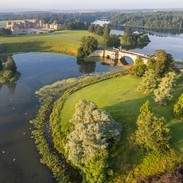England's sector strengths
Why England?
England is a country fuelled by inspiration and energy, as channelled by pioneers and groundbreaking artists including William Shakespeare, Isambard Kingdom Brunel, Florence Nightingale, Sir Richard Branson and The Beatles.
Pair world-class service and hospitality with England’s unique blend of history, tradition and innovation, inspiring your delegates to imagine what’s possible as you meet in the birthplace of stainless steel, the electric motor, penicillin and the programmable computer.
Offering easy global connectivity, sustainable transport and venues, value for money and an unmatched network of academic and industry leaders, England stands ready to offer a warm welcome for any business event.
England's sector strengths
As the home of Sir Isaac Newton, Charles Darwin, Ada Lovelace, Alan Turing and Stephen Hawking, England has a long history as the birthplace of discovery and new ideas. Our universities are among the most distinguished academic institutions in the world, and England’s experts stand as world leaders in life sciences, trade and manufacturing, automotive, aerospace, information and communication technology, sustainability and the creative arts.
Enrich your event by leveraging our expertise and forward-thinking ambition in these priority sectors.
England is a world pioneer in the advanced materials sector, which covers composites, plastic, nanomaterials, ceramics, alloy and steel production. With cutting-edge technology and research, Manchester, Leeds, Birmingham, Stoke-on-Trent, Bath, Bristol and Sheffield are just some of the locations leading the way in advanced materials.
Driving research and development in the composites sector, the National Composites Centre in Bristol is accelerating the development and uptake of digital technologies for sustainable composites and facilitating innovation through collaboration.
Stainless steel was invented in 1913 by English metallurgist Harry Brearley, the son of a Sheffield steelworker, and Sheffield remains England’s ‘Steel City.’ These days Sheffield is home to large-scale suppliers like Sheffield Forgemasters, Argent Steel, Anchor Manufacturing and Murray Steel Products, as well as smaller workshops creating specialist products like tools and cutlery.
The universities of Cambridge, Oxford, Manchester and Imperial College London are among the world’s top-ranking institutions for materials science. The University of Sheffield’s Advanced Manufacturing Research Centre and the Future Electrical Machines Manufacturing Hub develop production solutions across many areas including automation and robotics, additive and subtractive manufacturing, structural and materials testing, and design and prototyping for the aerospace, automotive, food and drink, construction and healthcare industries.
Sustainable infrastructure is a priority for England’s future. The Construction Innovation Hub in Coventry works in partnership with organisations, policymakers, practitioners and academics to build solutions for a more resilient and environmentally sustainable construction sector.
England is a major player in the global automotive industry and home to the headquarters for luxury brands including Aston Martin in Warwickshire, Bentley Motors Ltd in Crewe, Lotus in Norwich, McLaren Automotive in Woking, Rolls-Royce Motor Cars Ltd. in West Sussex and Jaguar Land Rover in Coventry. International manufacturers including BMW, Mini, Nissan, Toyota and Vauxhall have plants in England, leveraging our automotive expertise and employing over 182,000 workers across the UK.
England’s automotive industry also leads the charge on zero emission vehicles, with an estimated £11.48 billion invested in EV production, research and development in the country since 2011. Alcraft Motor Company, London Electric Vehicle Company and REE Automotive specialise in developing and manufacturing electric vehicles. Coventry and Warwickshire is a global centre for automotive software innovation, while the North East of England is a hub for electric vehicle battery production, home to two gigafactory sites and a concentration of leading academic research including Newcastle University’s Electrification Process Innovation Cluster, the Durham Energy Insitute and research programmes at Northumbria and Sunderland universities.
Connect with automotive engineering experts at the University of Surrey’s Centre for Automotive Engineering, the Birmingham CASE Automotive Research and Education Centre or the Automotive and Autonomous Vehicle Technology Labs at the University of Salford. Embrace England’s motoring heritage and inspire your delegates by hosting an event at the Coventry Transport Museum or the National Motor Museum in the heart of the New Forest.
With our eyes to the sky, England is also a centre for excellence in aerospace and space engineering. Bristol is home to the headquarters of Airbus UK as well as Vertical Aerospace, a global manufacturer that designs and builds zero emissions, electrical vertical take-off and landing (eVTOL) aircraft. Other companies specialising in aeronautical work across multiple locations in England include Leonardo S.p.A., BAE Systems, Boeing, GE Aviation, Lockheed Martin, Rolls-Royce, Cobham Aerospace Communications and Thales Group.
The Aerospace Growth Partnership is a strategic collaboration between the UK Government and stakeholders in the aerospace industry, convening representatives from the private and public sectors, trade associations and academia. Imperial College London and the universities of Cambridge, Manchester, Southampton, Bristol, Leeds and Birmingham are among England’s top schools for aerospace engineering.
Space research hubs include the International Space Innovation Centre and European Space Agency centres in Oxford and the pioneering Institute for Aerospace Technology at the University of Nottingham. Meet with experts in astronomy research at Durham University, the University of Southampton, University of Sussex or the Royal Astronomical Society in London, or host an event that’s out of this world at the National Space Centre in Leicester.
England sets the pace when it comes to green technology, leading in investment, research and development of renewable energy, sustainable infrastructure, green finance and shipping.
England is committed to achieving net zero carbon emissions by 2050, supported by substantial investment into renewable energy. Facilities in and around Liverpool, Southampton, Hull and the Tees Valley are home to research and ambitious projects in low-carbon hydrogen, while recent investments in manufacturing facilities by Siemens Gamesa in Hull, Smulders in Newcastle and SeAH in Teesside in the North East of England indicate that offshore wind will provide growing opportunities for employment and development in the years ahead.
For centuries England has set international standards for marine science and the global maritime industry, and the country continues doing its part to accelerate maritime decarbonisation. Research institutions like the National Oceanography Center based in Southampton and Liverpool and the University of Plymouth’s Marine Institute undertake world-leading research in areas such as large-scale oceanography, ocean measurement technology, coastal erosion and natural carbon capture, while England’s freeports are dynamic hubs not only for shipping and trade, but for innovation in low-carbon sectors like renewable energy and advanced manufacturing.
England is full of artist flair with thriving industries and academic programmes in creative sectors like advertising, architecture, fashion, television, film, design, gaming and mobile content.
Our cities ooze creativity: Bristol is home to street artist Banksy and the creators of Wallace and Gromit, Aardman Animations. Manchester hub MediaCity hosts the UK’s leading television facilities including studios for BBC and ITV, and nearby Bradford is the world’s first UNESCO City of Film. Enjoy art exhibitions, live music, theatre and large-scale festivals in cities like Liverpool, Birmingham, Brighton, Leeds, Durham, Exeter, Nottingham, Hull and NewcastleGateshead.
England is one of the world’s largest production locations for high-end film and television. Warner Brothers has studios in Leavesden, and the Warner Brothers Studio Tour draws crowds of Harry Potter fans from around the world. Pinewood Studios has signed long-term production deals with Netflix and Amazon MGM Studios and has been the backdrop for the James Bond films since the 1970s.
Hold your event in venues designed by England’s architectural giants like Sir Christopher Wren, Sir David Chipperfield, Lord Norman Foster and Lord Richard Rogers. Meet with experts at today’s leading architectural firms like Foster & Partners and Atkins in London or BDP in Manchester.
The global fashion industry has been shaped by national treasures including Mary Quant, Vivienne Westwood, Paul Smith, Stella McCartney and Alexander McQueen. Discover new ideas from budding designers at the universities of Loughborough, Kingston, Staffordshire, Coventry and the University of the Arts London.
For English art history lessons head to The Lowry art gallery in Manchester for the Lancashire painter’s matchstick men or Tate Britain for prints by Bradford-born David Hockney. Budding art historians graduate from Oxford, Cambridge and Warwick universities.
The UK is home to Europe’s largest video game sector and England’s games industry employs an estimated 22,500 people in centres like Newcastle, Nottingham, Liverpool, Manchester, Guildford, Cambridge, Oxford, London and Brighton. These are exciting times for mobile gaming with companies racing to meet the demand for smart phone apps: the UK has 16 million smart phone users and over half of the apps downloaded here are games.
Learn more about the Creative Industries in the UK (PDF, 3.61 MB).
England boasts a strong network of technology firms, startups and academic experts driving digital and technological innovation forward.
Our cities are global hotspots for tech startups. The UK is home to a third of Europe’s unicorns – startups that have reached a valuation of at least $1 billion – and seven of England’s cities are home to multiple unicorns: Bristol, Cambridge, Leeds, London, Manchester, Nottingham and Oxford. London is home to over 150 unicorns and has attracted more new international tech companies than any other global city in the past decade.
England’s educational technology sector is one of the largest and fastest growing in Europe. London hosts two of the largest EdTech industry events in the world – EdTechX and Bett Show – and the University College London’s EDUCATE Knowledge Lab facilitates research and innovation in this specialised field.
Cybersecurity is another area of expertise. England’s South East is home to over 1,000 cyber security firms and our cybersecurity market is diverse, covering areas from cyber professional services to endpoint and mobile security. Manchester, Gloucestershire and the Cyber Quarter – Midlands Centre for Cyber Security in Herefordshire are home to further clusters of cybersecurity startups and innovation labs. The sector is fuelled by new talent studying cybersecurity at top universities such as University College London, Newcastle University and the universities of Wolverhampton, Bristol, Southampton, Sheffield, Nottingham, Warwick and Birmingham.
Many of the world’s largest, most influential tech companies call England home: Bristol is home to over 430 tech companies including international firms such as Amazon, Nokia, BT, Vodafone and Oracle, while Cambridge is Europe’s largest technology cluster with over 5,000 tech companies. Across England’s Northern Powerhouse Manchester is the UK’s top digital tech city, home to a £5 billion tech industry across over 10,000 digital and tech businesses including Google, Microsoft, IBM and the tenants of creative hub MediaCity. NewcastleGateshead is home to multinational software company The Sage Group Plc.
Learn more about Technology in the UK (PDF, 10.6 MB).
England is Europe’s leading hub for finance and professional services. Between London’s Square Mile of offices, Leeds’s thriving Financial Quarter, Bristol’s banking centre and metropolises like Birmingham and Manchester, England’s financial and professional services sector employs 5.1 million people, offering expertise in law, accountancy, insurance, management consulting, pensions, private equity and banking.
England makes a strong case for legal professionals. Barristers train and work in London’s Inns of Court, which date back to the 14th century. The world’s top 50 law firms all have a presence in London, while one of the biggest law firms in the world, DLA Piper, maintains offices in Birmingham, Leeds, Liverpool, London, Manchester and Sheffield. Top lawyers graduate from Cambridge, Oxford, University College London, Durham University, University of Nottingham, University of Bristol and University of Warwick every year.
Birmingham and the Midlands are home to more business, finance and law graduates than in any other UK city-region outside of London. The Midlands cluster of professional and business services is among the largest in Europe, offering legal, accounting and management consultancy firms and 75,600 employees in this region of central England.
As one of the world’s top finance hubs, England is at the forefront of green finance and innovation. The London Stock Exchange offers the Green Economy Mark, enabling investors to identify companies and funds with primarily ‘green’ revenue streams, and the Green Finance Institute works to channel capital towards an environmentally sustainable economy. The National Infrastructure Bank (UKIB) and the Centre for Greening Finance and Investment (CGFI) work to prioritise and generate opportunities for environmentally friendly investment, and both have offices in London and Leeds.
England has its finger on the pulse with a strong life sciences sector covering medical devices and diagnostics, pharmaceuticals and biotechnology.
England’s life science sector employs over 248,000 people and generates an annual turnover of over £84 billion.
Following in the footsteps of pioneers like Sir Alexander Fleming, who discovered penicillin in London, or James Watson and Francis Crick who discovered the double helix structure of DNA at Cambridge University, groundbreaking research continues at England’s universities such as Bath, Bristol, Cambridge, Manchester, Newcastle, Oxford, Sheffield, Warwick and York.
Cancer Research UK leads a network of research centres across the UK, including nine hubs in England: Birmingham, Cambridge, Leeds, Leicester, London, Manchester, Newcastle, Oxford and Southampton. The National Institute for Health and Care Research has established 20 Biomedical Research Centres across England, bringing together academics and clinical researchers to develop treatments, diagnostics and health technologies in areas related to genomics, multimorbidity, immunology, precision medicine, rare diseases, imaging and data and digital health.
The future is bright for life sciences in England, as the UK Government has recently launched a £400 million programme to support cutting-edge health research through the National Health Service (NHS), the first public-private collaboration of this scale in the world.
England does not just excel in clinical research: Sports science is a popular subject at Leicester and Sheffield universities, Liverpool and Nottingham universities are centres for nurse training and Birmingham and Bath are leading universities in psychology.
International pharmaceutical and medical companies cluster in England’s cities. Leeds is home to DePuy Synthes, manufacturers specialising in orthopaedics, while Hull hosts offices for wound management specialists Smith and Nephew as well as the R&D Centre for pharmaceutical giant Reckitt.
Learn more about Healthcare and life sciences in the UK (PDF, 11.23 MB).
England has set the stage for some of the world’s most memorable sporting events, from the 2012 London Olympics and the 2022 Birmingham Commonwealth Games to nail-biting final matches at Wimbledon or the UEFA Champions League at Wembley. Come to England to cheer for your favourite team in the English Premier League or Six Nations Rugby, head to Ascot or Cheltenham for a day at the races or get your adrenaline pumping with some F1 action at the British Grand Prix.
World-class sporting events also mean world-class venues to host them. Many of England’s iconic arenas offer private meeting spaces and hospitality packages, or you can choose from unique venues like the National Football Museum in Manchester, the World Rugby Museum or the British Motor Museum near London to make your meeting or incentive experience unforgettable.
Sport and physical activity contribute £15.9 billion annually to the England economy. In addition to a wide range of clubs and sporting organisations, the UK also hosts more sports tech start-ups than any other country in Europe. Businesses in the sports industry benefit from research being done at universities such as Sheffield Hallam University and Loughborough University’s Sports Technology Institute, as well as government-supported institutions like UK Sport and Sport England.
The North of England hosts a cluster of sports tech companies, while London was the top European city for sports tech funding from 2016-2020 and remains home to market-leading sports tech companies. The capital also boasts the first purpose-built NFL pitch outside of the United States, which seats over 62,300 American Football fans for the annual NFL London Games.










